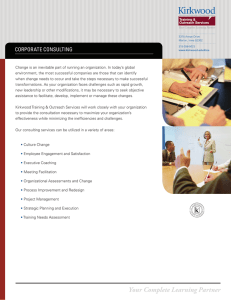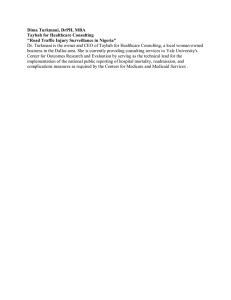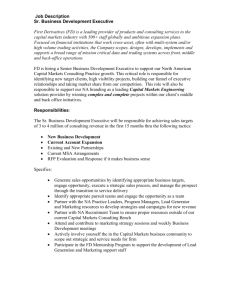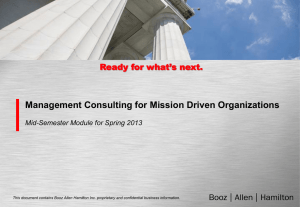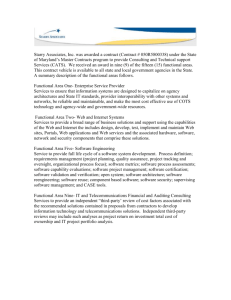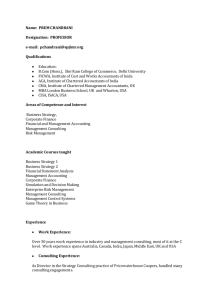USC M S B
advertisement
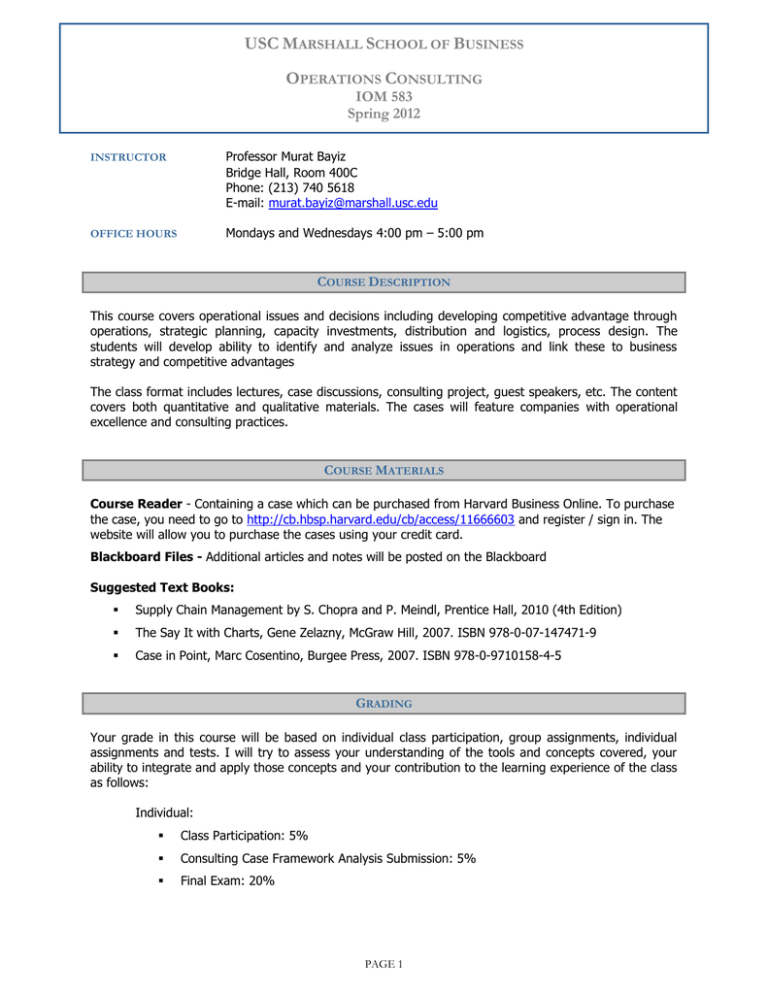
USC MARSHALL SCHOOL OF BUSINESS OPERATIONS CONSULTING IOM 583 Spring 2012 INSTRUCTOR Professor Murat Bayiz Bridge Hall, Room 400C Phone: (213) 740 5618 E-mail: murat.bayiz@marshall.usc.edu OFFICE HOURS Mondays and Wednesdays 4:00 pm – 5:00 pm COURSE DESCRIPTION This course covers operational issues and decisions including developing competitive advantage through operations, strategic planning, capacity investments, distribution and logistics, process design. The students will develop ability to identify and analyze issues in operations and link these to business strategy and competitive advantages The class format includes lectures, case discussions, consulting project, guest speakers, etc. The content covers both quantitative and qualitative materials. The cases will feature companies with operational excellence and consulting practices. COURSE MATERIALS Course Reader - Containing a case which can be purchased from Harvard Business Online. To purchase the case, you need to go to http://cb.hbsp.harvard.edu/cb/access/11666603 and register / sign in. The website will allow you to purchase the cases using your credit card. Blackboard Files - Additional articles and notes will be posted on the Blackboard Suggested Text Books: Supply Chain Management by S. Chopra and P. Meindl, Prentice Hall, 2010 (4th Edition) The Say It with Charts, Gene Zelazny, McGraw Hill, 2007. ISBN 978-0-07-147471-9 Case in Point, Marc Cosentino, Burgee Press, 2007. ISBN 978-0-9710158-4-5 GRADING Your grade in this course will be based on individual class participation, group assignments, individual assignments and tests. I will try to assess your understanding of the tools and concepts covered, your ability to integrate and apply those concepts and your contribution to the learning experience of the class as follows: Individual: Class Participation: 5% Consulting Case Framework Analysis Submission: 5% Final Exam: 20% PAGE 1 OPERATIONS CONSULTING Group of Two Students: Excel Data Exercise: 5% Company Profile Exercise: 5% Short Case Submissions (2 reports): 5% CPFR Research Paper: 5% Group of Four or Five Students CPFR Project (Analysis, Report, Presentation): 7.5% Group Case Write-ups and Presentations (2 reports): 7.5% Group Consulting Project (Analysis, Report, Presentation): 35% CLASS PARTICIPATION Class participation requires that you do the assigned readings, analyze the cases based on the questions given and participate actively in class. I prefer substantive comments based on good analysis rather than brief, general comments that add little to the discussion and learning. If you are reluctant to talk in class but would like to show your preparation, please provide me with your analysis before class. Be prepared to defend your suggestions or solutions with careful and thoughtful analysis! Useful criteria for measuring effective class participation include: Is the student absent too many times? Is the participant a good listener? Are the points that are made relevant to the discussion? Are they linked to the comments of others? Is there a willingness to participate and bring new ideas? Do the comments show evidence of analysis of the topic or the case? Do the comments clarify or build upon the important aspects of earlier comments and lead to a clearer statement of the concepts being covered? CONSULTING CASE FRAMEWORK ANALYSIS SUBMISSION Students will analyze a short consulting case within frameworks discussed in class and submit two pages write up. FINAL EXAM There will be a final exam that covers the materials we learn throughout the semester. According to the USC Final Exam Schedule, the final exam is scheduled for May 7th, at 2:00 pm. Please take this into account when scheduling your trips! If there are extenuating circumstances that prevent you from taking an exam, you must discuss the reason with me before the time of the exam. You will not be given a make-up exam unless you obtain permission from me in advance. In addition, you must be able to document the extenuating circumstance. If you miss the exam due to a medical emergency that can be documented and verified, then a make-up exam will be given. Otherwise, a grade of zero will be given for the missed exam. PAGE 2 OPERATIONS CONSULTING EXCEL DATA EXERCISE SUBMISSION A real life project data set will be given in multiple files. Students are required to linked them, prepare summary tables by using Pivot Tables, and choose the best way to present the summary data in Power Point. COMPANY PROFILE Outside-in analysis provides an important input to generate new business for consulting companies. Consultants research the company specific information including general trends in the industry, the target company’s position compared to the competition, benchmarking financial performance of the target company with its competitors. A company profile template will be provided to the students and students will prepare a company profile report for a specific target company. GROUP CASE REPORTS There will be two group case reports and you will be working with your consulting project teams for these write-ups. This syllabus provides some suggested questions (in the detailed weekly course plan) that you should address in your analysis. Each team is required to submit a written report. The write-up should begin with an executive summary and be organized as follows: Brief description of the company and its environment Brief description of the problems and issues to be addressed Recommendations and implementation plan Analysis that discusses why the recommendations will solve the problems identified You may choose to organize the report differently; however, please ensure that the above aspects are covered and the report is well organized with clear section and sub-section headers. Please avoid repetition of case facts and long expositions. General solutions to specific problems will get you little credit. Consider what and why you believe are the most important factors. Both quantitative and qualitative analyses are important. Creativity in analysis and suggestions that are grounded in case facts will be given high credit. Please state any assumptions made clearly. INDIVIDUAL CASE SUBMISSIONS In addition to the cases (for which you are required to submit group reports), we will be discussing several other cases and articles. You should be prepared for class discussion, and this syllabus provides some suggested questions that you should address. For the individual submissions, please prepare a short write-up (one half to one page long) answering the question(s) listed in the detailed schedule section. The objective of this short submission is to ensure that you prepare the case. For that reason, no late submissions will be accepted. If you are not able to attend the class, you can submit your assignment online through the Blackboard before the class. If you are attending the class, please bring a hard copy of your submission and hand it in at the beginning of the class. As long as your answer shows that you have given sufficient thought to the analysis, you will get full credit. CPFR RESEARCH PAPER AND PROJECT Collaborative Planning, Forecasting, and Replenishment (CPFR) is an important concept in Operations Consulting to enhance supply chain coordination and visibility. Consultants establish processes to enable the supplier and the retailer to work together to generate collaborative future sell-through forecasts and replenishments. In this assignment, students will first prepare a research paper on CPFR and then work on a CPFR project in which I will be the client. The research paper and project details will be given in PAGE 3 OPERATIONS CONSULTING separate handouts. During the project, I will be your client and explain you my challenges and you will work with me to improve my business. It is originated from one of my earlier projects and share a real life data set (with product and company names disguised.) The project includes selecting a retailer for pilot implementation; sell through forecast, weeks of supply, and replenishment order calculations. GROUP CONSULTING PROJECT The consulting project will give you the opportunity to deal with the details of a hands-on operations consulting project and honing your consulting skills. Project details will be given in a separate handout. Each team will be responsible for organizing itself and gathering further information pertaining to the company and the consulting project. This will involve visiting the Southern California offices of the companies, conference calls, etc. I will provide guidance on the projects throughout the semester and will meet with you. Each team will make an interim presentation and a final presentation. The reports will be in Power Point format (plus any appendices). Apart from being reviewed and evaluated by the instructor, it will also be sent to the client company. GROUP ASSIGNMENT EVALUATIONS Team assignments provide a valuable learning experience – how to work effectively and efficiently in groups, learning from others, and honing your ability to communicate to others. Although your team’s grade depends on each member’s efforts, some students can be tempted to let others carry their load. In order to provide an incentive for all students to make maximum contributions to the study group, you will be asked to grade each team member’s contributions. Your group grades will be adjusted to obtain an individual grade based on feedback about performance provided by other members of the group (I will post the group assessment form on Blackboard). If you do not submit your group assessment form, it is assumed that you have assigned a rating of 100% to all your group members. NOTICE ON ACADEMIC INTEGRITY The use of unauthorized material, communication with fellow students during an examination, attempting to benefit from the work of another student, and similar behavior that defeats the intent of an examination or other class work is unacceptable to the University. It is often difficult to distinguish between a culpable act and inadvertent behavior resulting from the nervous tensions accompanying examinations. Where a clear violation has occurred, however, the instructor may disqualify the student's work as unacceptable and assign a failing mark on the paper. Academic dishonesty includes: (Faculty Handbook, 1994: 21-22): Examination behavior - any use of external assistance during an examination shall be considered academically dishonest unless expressly permitted by the teacher Plagiarism - the appropriation and subsequent passing off of another’s ideas or words as one’s own. If the words or ideas of another are used, acknowledgment of the original source must be made through recognized referencing practices Other types of academic dishonesty - submitting a paper written by or obtained from another, using a paper or essay in more than one class without the teacher’s express permission, obtaining a copy of an examination in advance without the knowledge and consent of the teacher, changing academic records outside of normal procedures and/or petitions, using another PAGE 4 OPERATIONS CONSULTING person to complete homework assignments or take-home exams without the knowledge or consent of the teacher FOR STUDENTS WITH DISABILITIES Any student requesting academic accommodations based on a disability is required to register with Disability Services and Programs (DSP) each semester. A letter of verification for approved accommodations can be obtained from DSP. Please be sure the letter is delivered to me as early in the semester as possible. DSP is located in STU 301 and is open 8:30 a.m. - 5:00 p.m., Monday through Friday. The phone number for DSP is (213) 740-0776. PAGE 5 OPERATIONS CONSULTING TENTATIVE COURSE PLAN Topic Week # 1 2 3 Dates January January January January January January 9& 11 16 & 18 23 & 25 Monday Wednesday Assignments Course Introduction Operational Innovation Consulting Frameworks No Class - MLK Day Framework Practices Working with Excel and Developing Charts Working with Excel and Developing Charts Case Framework Analysis Due on January 25 4 January 30 & February 1 Guest Speaker: Pooja Lohia from G4S Group Consulting Project Discussion Deloitte Case Excel Data Exercise Short Case Write Up (Deloitte) Both due on February 1 5 February 6 & February 8 CPFR Project Work One on One Discussions CPFR and Henkel Case CPFR Research Papers Short case write up (Henkel) Both due on February 8 6 February 13 & February 15 Guest Speaker: Owen Hall from E&Y Outside-In Company Analysis 7 February 20 & February 22 No Class - Presidents' Day Operational Metrics and Benchmarking Consulting Project Plan due on February 22 8 February 27 & February 29 Guest Speaker: Anant Kumar from PwC CPFR Project Presentations Company Profile Exercise CPFR Project Report Both due on February 29 March March March March 5& 7 12 & 14 Consulting Project Field Work Outsourcing 10 March 19 & March 21 Guest Speaker: Yanick Desmaris from Deloitte Six Sigma & Maple Leaf Case 11 March 26 & March 28 Consulting Project Progress Presentations Consulting Project Progress Presentations 12 April 2 & April 4 Consulting Project Field Work JIT Lean Manufacturing 13 April 9 & April 11 Guest Speaker Southwest Case 14 April 16 & April 18 Consulting Project Field Work Course Review and Practice Final 15 April 23 & April 25 Final Presentations Final Presentations 9 Color Legend Spring Break Group Case Write Up (Maple Leaf) Due March 21 Consulting Project Progress Deck Due on March 26 Group Case Write up (Southwest) Due on April 11 Consulting Project Presentation draft Due on April 18 (email) Final Consulting Project Deck Due on April 23 No class - University Holiday No class - Project/Field Work PAGE 6 OPERATIONS CONSULTING TENTATIVE DETAILED CLASS SCHEDULE WEEK 1 – JANUARY 9 & JANUARY 11, 2012 January 9th: Course Introduction January 11th: Operational Innovation and Consulting Frameworks Reading: [Blackboard] The Anatomy of a Consulting Firm By David H. Maister [Online Course Reader] Deep Change: How Operational Innovation Can Transform Your Company WEEK 2 – JANUARY 16 & JANUARY 18, 2012 January 16th: No Class – MKL Day January 18th: Consulting Framework Practices WEEK 3 – JANUARY 23 & JANUARY 25, 2012 January 23rd: Excel Session on Managing Data January 25th: Developing Charts with Excel for Power Point Assignment: (Individual) Consulting Case Framework Analysis. Due on January 25th WEEK 4 – JANUARY 30 & FEBRUARY 1, 2012 January 30th: Guest Speaker: Pooja Lohia from G4S February 1st: Consulting Case Project Discussion & Deloitte Case Case: [Online Course Reader] Deloitte & Touche Consulting Group (HBS #9-696-096) Discussion Questions: 1. Why does SKS need Deloitte’s services? What alternatives were available to it? Would you have approached the improvement problem in the same way as an internal operations manager? 2. What specific steps would you take to solve SKS’s short term and long term problems? 3. What is your assessment of Maria Chen’s performance? 4. Imagine that you are Chen. A foreman comes up to you on the shop floor and asks “How many times have you done this before?” What will you say? 5. What should Chen do? PAGE 7 OPERATIONS CONSULTING Assignments: (Group of Two) Short Case Submission on Deloitte – Answer Question # 4. Due on February 1st (Group of Two) Excel Data Exercise. Due on February 1st WEEK 5 – FEBRUARY 6 & FEBRUARY 8, 2012 February 6th: No class – CPFR Project Work (Make appointments to meet me with your group) February 8th: CPFR and Henkel Case Discussion Case: [Course Reader] Henkel Iberica (A) (HBS #9-105-023) Discussion Questions: 1. What are the implications of SKU (stock-keeping unit) proliferation for Henkel Iberica’s functional areas, such as manufacturing, logistics, procurement, and marketing? What are the costs and benefits of manufacturing a large variety of SKUs? 2. What does an Everyday Low Price (EDLP) strategy mean? What are the costs and benefits of this strategy? 3. Explain CPFR. Does CPFR mitigate the costs of SKU proliferation? In what sense? 4. What strategy would you recommend to Henkel Iberica: (a) Adopt EDLP and rationalize the number of SKUs or (b) maintain or increase the current level of SKUs, while adopting CPFR? Assignments: (Group of Two) CPFR Research Report. Due on February 8th (Group of Two) Short Case Submission on Henkel – Answer Question # 2. Due on February 8th WEEK 6 – FEBRUARY 13 & FEBRUARY 15, 2012 February 13th: Guest Speaker: Owen Hall from E&Y February 15th: Outside In Company Analysis WEEK 7 – FEBRUARY 20 & FEBRUARY 22, 2012 February 20th: No class – Presidents’ Day February 22nd: Operational Metrics and Benchmarking Assignment: (Project Team) Consulting Project Plan. Due on February 22nd WEEK 8 – FEBRUARY 27 & FEBRUARY 29, 2012 February 27th: Guest Speaker: Anant Kumar from PwC February 29th: CPFR Project Presentations PAGE 8 OPERATIONS CONSULTING Assignments: (Group of Two) Company Profile Analysis. Due on February 29th (Project Team) CPFR Project Reports. Due on February 29th WEEK 9 – MARCH 5 & MARCH 7, 2012 March 5th: No class – Consulting Project Field Work March 7th: Outsourcing MARCH 12 & MARCH 14, 2012 No Class – Spring Break! WEEK 10 – MARCH 19 & MARCH 21, 2012 March 19th: Guest Speaker: Yanick Desmarais from Deloitte March 21st: Six Sigma and Maple Leaf Case Analysis Case: [Online Course Reader] Six Sigma Implementation at Maple Leaf Foods (Ivey #905D16) Discussion Questions: 1. What is your list of questions for Louann? 2. What criteria would you use to evaluate the readiness of the Rivermede plant to proceed with implementation of Six Sigma @ the Edge? 3. Why has Six Sigma been successful under Anthony’s tenure at Rivermede? Why had it been unsuccessful previously? 4. What is the role of Six Sigma in the Maple Leaf Foods organization? Is it a set of tools or a manufacturing philosophy? Is it strategic or tactical? 5. What resources would you need to implement Six Sigma @ the Edge? 6. Which group will feel the greatest impact if Six Sigma @ the Edge is implemented: managers, supervisors or plant workforce? Assignment: (Project Team) Case Report for Maple Leaf. Due on March 21st WEEK 11 – MARCH 26 & MARCH 28, 2012 March 26th: Consulting Project Progress Presentations March 28th: Consulting Project Progress Presentations Assignment: (Project Team) Project Progress Report. Due on March 26th PAGE 9 OPERATIONS CONSULTING WEEK 12 – APRIL 2 & APRIL 4, 2012 April 2nd: Guest Speaker: Clive Thomas from Nestle April 4th: JIT and Lean Manufacturing Reading: [Blackboard] Decoding the DNA of the Toyota Production System By Steven Spear and Kent Bowen WEEK 13 – APRIL 9 & APRIL 11, 2012 April 9th: No class – Consulting Project Field Work April 11th: Southwest Airlines Case Analysis Case: [Course Reader] Southwest Airlines in Baltimore (HBS #9-602-156) Discussion Questions: 1. How does Southwest Airlines (SWA) compete? What are its advantages relative to other airlines 2. The plane turnaround process require coordination among twelve functional groups at SWA to service, in a brief period of time, an incoming plane to match it up with its new passengers and baggage for prompt departure. Please evaluate the plane turnaround process at Baltimore – resource utilization, capacity, bottleneck, information flows, etcs. How is the process working? 3. Why is the operational performance at Baltimore eroding? What issues do you identify that require action? 4. What would you recommend Matt Hafner do? Assignment: (Project Team) Case Report for Southwest. Due on April 11th WEEK 14 – APRIL 16 & APRIL 18, 2012 April 16th: No class – Consulting Project Field Work April 18th: Course Review and Practice Final Assignment: (Project Team) Consulting Project Report Draft. Due on April 18th (email) WEEK 15 – APRIL 23 & APRIL 25, 2012 April 23rd: Final Project Presentations April 25th: Final Project Presentations PAGE 10 OPERATIONS CONSULTING Assignment: (Project Team) Consulting Project Report. Due on April 23rd Final Exam: May 7th (Monday) between 2:00 pm – 4:00 pm PAGE 11

